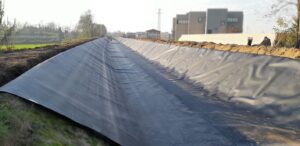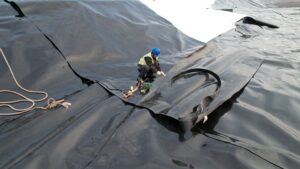Nine knowledge points of HDPE geomembrane:
HDPE geomembrane is a geotechnical material made of high-density polyethylene (HDPE), which has the functions of impermeability and isolation. It usually exists in film or flake form.
HDPE geomembrane has good anti-permeability, can effectively prevent the penetration of water and solutes, and reduce water loss and soil erosion.
HDPE geomembrane has excellent tensile strength and tear resistance, can withstand a certain force range and stress, and maintain the integrity of the material.
HDPE geomembrane has a certain degree of elasticity and flexibility, adapts to the deformation and movement of the ground or engineering structures, and has good anti-deformation ability.
HDPE geomembrane is often used in anti-seepage places such as pools, reservoirs, river embankments, seepage wells, and environmental engineering, and can be used to block and control water penetration.
HDPE geomembranes are often used on the bottom and sides of landfills to prevent seepage and protect the environment.
HDPE geomembrane can be used in reservoirs, tunnels, channels and other water conservancy projects to protect soil and prevent water penetration and damage.
HDPE (High Density Polyethylene) is a material commonly used in the manufacture of geomembranes and has good chemical properties.
HDPE geomembranes can be used in construction projects, such as basement waterproofing, roof garden anti-seepage, etc., to protect buildings from moisture damage.

Five chemical characteristics of HDPE geomembrane
Chemical stability: HDPE geomembrane has good chemical stability and can withstand the erosion and corrosion of most common chemical substances. It is relatively stable to acids and bases, solvents, salts and many organic compounds.
Corrosion resistance: HDPE geomembrane can withstand the erosion of many corrosive substances, such as acidic solution, alkaline solution, grease and some organic chemicals. It is often used to prevent the penetration of chemicals, waste water or other corrosive liquids into the soil.
pH range: The pH range of HDPE geomembrane is usually between 2-13, so it is suitable for engineering needs under acidic and alkaline conditions. Within this range, the chemical properties and stability of HDPE geomembrane can be maintained.
Impermeability: HDPE geomembrane has good impermeability and can effectively prevent the penetration of water, solute and gas. This helps control the diffusion of moisture and chemicals, reducing environmental pollution and soil erosion.
Thermal stability: HDPE geomembrane has certain thermal stability and can maintain the structure and performance of the material within a certain temperature range. It can withstand certain temperature changes and thermal stress.

About Us
Established in 2002, Tinhy’s teams are focusing on manufacturings, marketing, installations, applications, and R&D of geosynthetics. We now have 300+ experienced staff and operate 25+ advanced production lines and provided services to customers from 30+ countries.
Tinhy is in the line of geosynthetics productions for nearly 20 years and focuses on providing quality geosynthetics to our customers all over the globe. All of the products are available for applying in the fields of Waste Management, Water Management, Mining, Infrastructure, Agriculture, Aquaculture, Alternative Energy, Oil & Gas, etc.
Author
-

Founded in 2002, Tinhy's team focuses on the manufacturing, marketing, installation, application and research and development of geosynthetic materials.
View all posts




